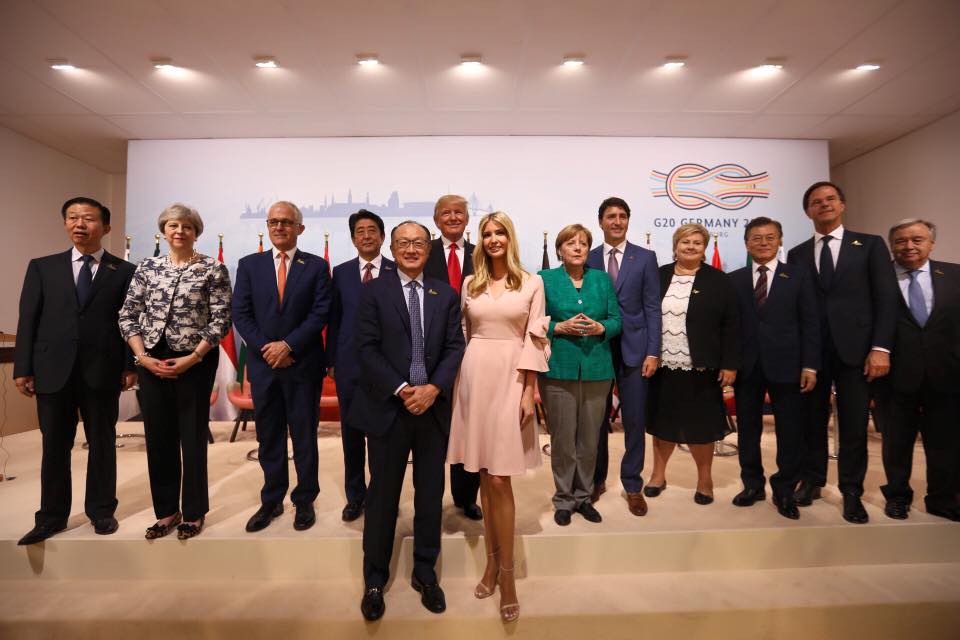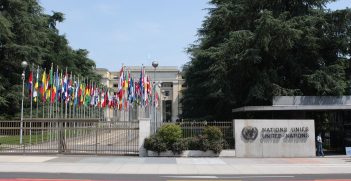A Murky Path to a Worthy Goal: The G20 Women's Initiative

It may have been lost in the hype, but a major new initiative to support women’s economic development was launched at the G20 Summit in Hamburg and the Trump family had a lot to do with its success.
The Group of 20 Leaders Summit in Hamburg was full of Sturm und Drang inside and protesters outside the summit venue. The media focused on the lack of consensus between the United States and the other members, dubbed the G19, on trade issues and on climate change; this was reflected in the final communiqué.
In the midst of all of this, a coalition of G20 states and the World Bank launched a new Financial Intermediary Fund at the bank that aims to leverage up to US$1 billion (AUD$1.3 billion) to support female entrepreneurs. Leaders from the US, Australia, the UK, Canada, Japan and Saudi Arabia attended with German Chancellor Angela Merkel.
The US announced it would support the Women Entrepreneurs Finance Initiative, which has been pushed by Donald Trump’s daughter Ivanka, with a $50 million pledge. President Trump said at the launch:
This incredible facility will have a significant impact on women’s economic development around the world. It will help increase opportunities and economic growth while addressing unique barriers women entrepreneurs face. I am proud the United States is helping to lead support of this unprecedented initiative.
So, in the midst of US isolation and controversy over Ms Trump taking the US seat from her father for a short period, Donald Trump engaged in an ambitious multilateral gender equality initiative. The bank is clear to point out that Ms Trump is a champion and has no other role, stating on their website:
While she helped initiate the idea for the facility and has been a strong advocate for the issue of women’s entrepreneurship, Advisor to the President Ivanka Trump will play no operational or fundraising role in the facility.
How did this come to pass? It seems a combination of a real policy problem, clever German diplomacy, Ms Trump’s efforts and World Bank needs.
The G20’s gender record
Since the Los Cabos Summit in 2012, the G20 has pledged to do more to promote women’s economic empowerment, stating in the 2012 Leaders declaration:
We commit to take concrete actions to overcome the barriers hindering women’s full economic and social participation and to expand economic opportunities for women in G20 economies.
The G20 Summit in Brisbane in 2014 made history by including a specific target to reduce the gender participation gap in formal labour markets in G20 economies by 25 per cent by 2025, whilst also outlining country strategies to achieve growth. Australia released its strategy just before the summit.
The Turkish presidency followed by setting up the W20 engagement group to provide policy advice to leaders. China consolidated this process with the W20 Summit in Xi’an where the representatives of G20 countries and invited guests agreed a communiqué to be presented to the G20 leaders in the lead-up to the Hangzhou summit.
Angela Merkel hosted a panel at the W20 in Berlin, introducing the women entrepreneurs finance concept with Ivanka Trump on a power panel including the Canadian Foreign Minister Chrystia Freeland, IMF head Christine Lagarde, Queen Maxima of the Netherlands, top African entrepreneur Juliana Rotich and more. However, the attendance and reception of Ivanka Trump by the audience received more analysis than the facility proposal.
What is We-Fi?
The Women Entrepreneurs Finance Initiative (We-Fi) is the first World Bank-led facility to advance women’s entrepreneurship at scale in developing countries. It will work to enable more than US$1 billion of financing to improve access to capital, provide technical assistance, and invest in other projects and programs that support women and women-led SMEs in World Bank Group client countries.
This idea has moved at lightning speed since being first touted in an opinion piece by Ivanka Trump and World Bank President Jim Yong Kim in the Financial Times on 25 April this year, as the W20 Summit met in Berlin. The first meeting of the governing committee of the new facility will be in October.
The US is joined in supporting the fund by Saudi Arabia (US$50 million), the United Arab Emirates (US$50 million), Germany (US$50 million), Norway (US$10.7 million), Denmark (US$10.4 million), Australia (US$10 million) and Canada (US$10 million).
How will We-Fi work?
The goal of the facility is to leverage donor grant funding–currently more than US$325 million–to unlock more than US$1 billion in international financial institutions and commercial financing by working with financial intermediaries, funds, and other market actors. This is being done by creating a Financial Intermediary Fund (FIF) at the World Bank. The World Bank and the International Finance Corporation will be the implementing partners, along with other multilateral development banks (the particular banks are not specified, but in this region, presumably the Asian Development Bank) that would propose private- and public-sector activities supported by the We-Fi facility.
The need is real
The W20 identified the structural barriers facing women entrepreneurs, who represent just over 30 per cent of formal, registered businesses worldwide.
The W20 recommends that the G20 support women entrepreneurs and female cooperatives to start-up and scale their operations, build capacity, ensure their equal access to finance and markets, and accord them their fair share in global value chains.
Some of the barriers are in the area of finance. Seventy per cent of women-owned SMEs in developing countries are either shut out by financial institutions or unable to receive financial services on adequate terms to meet their needs. This results in a nearly $300 billion annual credit deficit to formally women-owned SMEs. The World Bank states that “unfavourable business and regulatory environments“, lack of networks, knowledge, and links to high-value markets further constrain female entrepreneurship.
We also know that all around the world, including Silicon Valley, women entrepreneurs face harassment and discrimination, as documented only last month in the New York Times. What we don’t know is how these types of issues will be addressed by the World Bank, which produces excellent gender research but sometimes does not model best practice to match this evidence in-country.
We don’t know if the US funding for a facility like this could come at the expense of the Office of Global Women’s Issues in the State Department or the United Nations Population Fund (UNFPA) budget, real or perceived. Does it matter if Ivanka Trump proposed it, if it is a good idea responding to a real policy gap? Does it matter if the World Bank needed better relations with the Trump administration? Does it matter if Saudi Arabia has some of the world’s worst indicators of gender equality and, if so, should we reject its contribution or welcome the change (noting its recent election onto the UN Commission for the Status of Women)?
We don’t know yet which female entrepreneurs will be able to take advantage of the new facility or how. It’s good to move beyond microfinance for women, but will it be that only a select group of elite women benefits? Does that matter, as long as current development assistance like that of Canada is well targeted? In other words, can’t we pursue many strategies to combat the feminisation of poverty and unequal distribution of economic benefit between men and women in every society? How will different regions, like small island developing states in the Pacific, be treated?
The answer for now is to ask more questions of the donor countries and wait, with the cautious approval of the concept that women-owned businesses deserve support to overcome barriers of all kinds as a matter of human rights—not forgetting the proven economic benefits. One can appreciate that Chancellor Merkel and the Australian government might wish to support any expression of US beneficial multilateralism, and especially for a credible initiative such as this. It may be a murky path to a worthy goal. But we should assess the We-Fi on its own merits.
Dr Susan Harris Rimmer is an Australian Research Council future fellow in Griffith Law School, and an adjunct reader in the Asia-Pacific College of Diplomacy at the Australian National University. Susan was selected as an expert for the official Australian delegation to the 58th session of the UN Commission on the Status of Women in New York in March 2014, and was one of two Australian representatives to the W20 in Berlin with AIIA National Vice President Zara Kimpton OAM.
This article is published under a Creative Commons Licence and may be republished with attribution.





